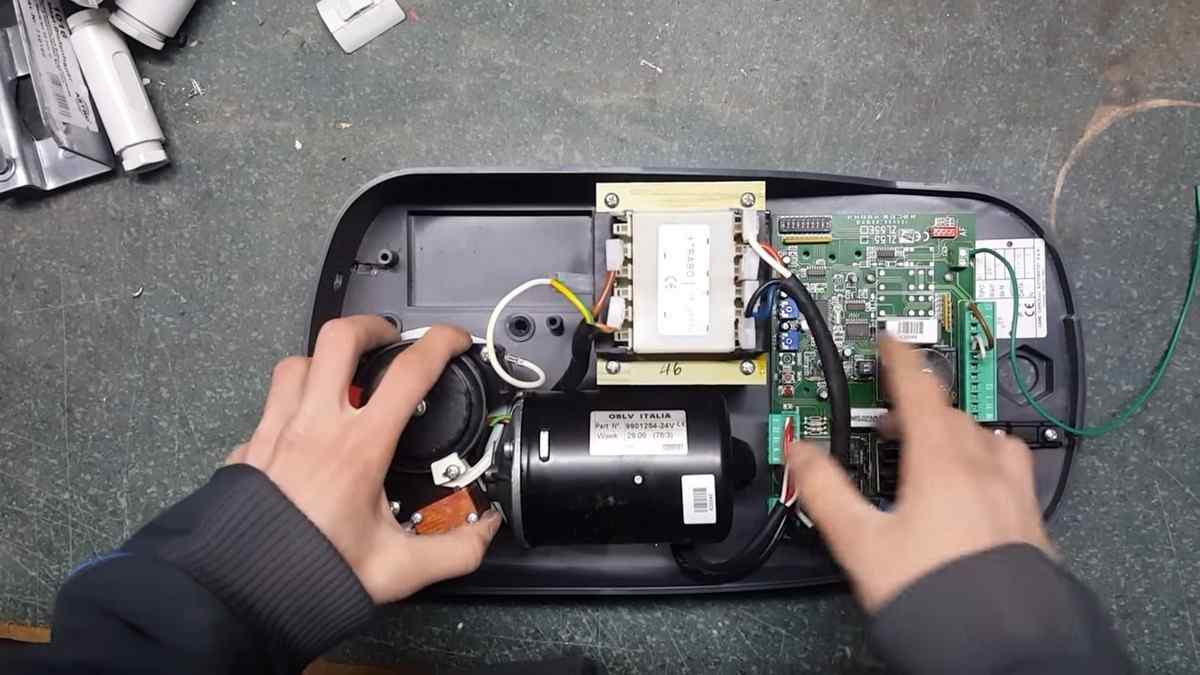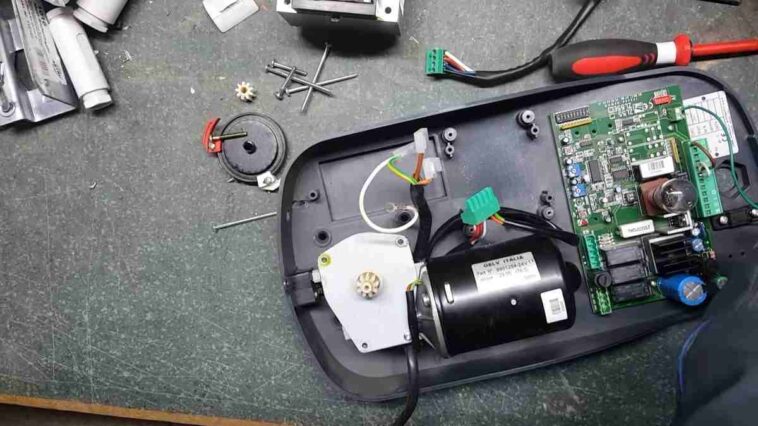Affiliate Disclosure: We may earn money or products from the companies mentioned in this post.
Garage doors play a vital role in providing security and convenience for homeowners. They rely on a motor to operate smoothly and efficiently. However, these motors can experience wear and tear over time, leading to malfunctions.
In this blog post, we will explore the signs that indicate a bad garage door motor and discuss methods for diagnosing the issue. Whether facing a faulty motor or simply curious about its condition, this guide will provide valuable insights. So, let’s dive in and learn how to tell if a garage door motor is bad.
How Can You Tell if a Garage Door Motor Is Bad?
Garage doors are essential to any home, providing convenience and security. A garage door’s smooth and reliable operation relies on a functioning motor. However, garage door motors can experience wear and tear over time, leading to malfunctions.
1. Unusual Noises
One of the primary indicators of a bad garage door motor is the presence of unusual noises during operation. When a motor is functioning optimally, it should operate quietly and smoothly. However, if you notice grinding, scraping, rattling, or other unusual noises coming from your garage door motor, it could be a sign of internal damage or misalignment.
These noises indicate that the motor struggles to operate correctly and may require attention or repairs.
2. Lack of Response
A garage door motor that fails to respond or only moves partially when the button is pressed clearly indicates a problem. When you activate your garage door opener, the motor should immediately respond by initiating the door’s movement.
If the motor doesn’t respond or only partially moves the door, it suggests an issue with its functionality. This lack of response could be due to electrical problems, worn-out components, or other motor-related issues.
3. Slow or Jerky Movement
Another sign of a bad garage door motor is slow or jerky movement during operation. Ideally, when you open or close your garage door, it should move smoothly and consistently. However, if you notice that your garage door moves sluggishly, pauses, or exhibits jerky motions, it could indicate that the motor is struggling to perform correctly.
This could be due to worn-out gears, a lack of lubrication, or other mechanical issues within the motor.
4. Excessive Vibrations
A garage door motor that produces excessive vibrations during operation is another sign of a potential problem. While some level of vibration is normal, especially during the door’s movement, excessive vibrations can indicate underlying issues with the motor. These vibrations could result from loose components, worn-out parts, or misalignment within the motor.
If you notice significant vibrations or shaking when your garage door is in motion, it’s essential to investigate the cause and address it promptly to prevent further damage.
5. Unresponsiveness
When your garage door fails to respond to remote or wall-mounted button commands consistently, it could indicate a malfunctioning motor. A properly functioning motor should promptly initiate the opening or closing of the garage door when the appropriate command is given.
However, suppose you find yourself repeatedly pressing the button or using the remote without responding from the door. In that case, it suggests a problem with the motor’s ability to receive and process signals. This can be due to electrical issues, faulty wiring, or internal motor problems.
6. Automatic Reversal Problems
Modern garage doors have safety sensors that automatically reverse the door’s movement if an obstruction is detected. This safety feature prevents accidents and ensures the door doesn’t close on objects or people. If your garage door doesn’t reverse when it should, it could indicate a problem with the motor or the sensor system.
This issue may arise if the motor fails to receive the appropriate signals from the sensors or if the sensors malfunction. Prompt attention is required to address this safety concern and prevent any potential accidents.
7. Inconsistent Speed
If your garage door operates at varying speeds or exhibits sudden changes in speed during operation, it could be a symptom of motor issues. Ideally, the motor should maintain a consistent speed throughout the door’s movement, ensuring smooth and efficient operation.
However, suppose you notice that the door moves at different speeds or experiences sudden changes in speed. In that case, it suggests a problem with the motor’s ability to regulate and maintain consistent power output. This could be due to worn-out motor components or electrical irregularities within the motor system.
What Are the Signs That Indicate a Bad Garage Door Motor?
Identifying the signs of a bad garage door motor is crucial for timely repairs or replacement. Here are some common indicators that your garage door motor may be faulty:
- Unresponsiveness: When your garage door fails to respond to remote or wall-mounted button commands, it could be due to a malfunctioning motor.
- Intermittent Functionality: If your garage door works inconsistently or stops midway while opening or closing, it could indicate motor issues.
- Overheating: If the motor feels excessively hot to the touch after operating the garage door, it may be a sign of motor strain or impending failure.
- Burning Smell: A burning odor from the motor unit suggests internal components are overheating or have already suffered damage.
- Automatic Reversal Problems: Modern garage doors have safety sensors that automatically reverse the door’s movement if an obstruction is detected. The motor or sensor system may be at fault if your garage door doesn’t reverse when it should.
- Inconsistent Speed: If your garage door operates at varying speeds or exhibits sudden changes in speed during operation, it could be a symptom of motor issues.
Can I Troubleshoot My Garage Door Motor to Identify the Issue?

Yes, you can troubleshoot your garage door motor to identify the issue. Here are some steps you can follow:
- Visual Inspection: Begin by visually inspecting the motor and all its associated components. Look for any signs of damage, such as frayed wires, loose connections, or broken parts. Ensure the power source is connected properly, and the circuit breaker hasn’t tripped.
- Listen for Unusual Sounds: Open and close the garage door while listening for any unusual sounds from the motor. Grinding, scraping, or squealing noises may indicate a mechanical problem that needs attention.
- Test the Remote and Wall Switch: Try operating the garage door using the remote control and the wall switch. If the door doesn’t respond to either, it could indicate a problem with the motor or the power source.
- Check the Safety Sensors: Most modern garage door openers have safety sensors near the bottom of the door tracks. Make sure these sensors are aligned properly and free from any obstructions. If they are misaligned or blocked, the motor may not function properly.
- Inspect the Motor’s Gears: Some garage door motors have plastic gears that can wear out over time. Open the motor casing and inspect the gears for any signs of damage or excessive wear. If you notice any issues, you may need to replace the gears.
- Test the Motor’s Capacitor: The capacitor is a component that helps start the motor. If the motor is not running smoothly or fails to start, the capacitor could be the culprit. You can use a multimeter to test the capacitor’s continuity and replace it if necessary.
- Seek Professional Help: If you’ve gone through these troubleshooting steps and haven’t identified the issue, or if you’re uncomfortable working with electrical components, it’s best to contact a garage door technician. They have the knowledge and experience to diagnose and repair more complex motor problems.
Are There Any DIY Methods to Diagnose a Bad Garage Door Motor?
Over time, wear and tear or other issues may arise, leading to a malfunctioning or faulty motor. While seeking professional assistance for diagnosing and repairing garage door motor problems is recommended, you can try a few DIY methods to identify potential issues before contacting a technician.
- Unusual Sounds: One of the primary indicators of a bad garage door motor is unusual or excessive noise during operation. It could be a sign of motor damage if you notice grinding, scraping, or squeaking sounds. Start by disconnecting the garage door opener from the power source and manually opening and closing the door. If the noise persists, the motor is likely experiencing problems.
- Door Movement Issues: Another telltale sign of a bad garage door motor is irregular movement or failure to open and close smoothly. If you encounter sticking, jerking, or intermittent movement, it could be due to motor-related issues. Examine the tracks, rollers, and hinges for any obstructions or damage. Lubricate the moving parts and check if the problem persists. If it does, the motor may require attention.
- Overheating Motor: An overheating motor can indicate a potential problem. During the operation of your garage door, if you notice the motor becoming excessively hot to the touch, it could be a sign of a malfunction. Carefully inspect the motor for any burning odor, frayed wires, or loose connections. If you detect any of these issues, it is advisable to contact a professional technician to avoid further damage or potential safety hazards.
- Testing the Safety Reverse Mechanism: All modern garage door openers are equipped with a safety reverse mechanism, which ensures the door reverses its direction if an object or person is detected in its path. To test this mechanism, place a small object, such as a block of wood, in the door’s path and attempt to close it. The motor’s safety features may malfunction if the door does not automatically reverse upon contact with the object.
- Remote Control and Wall Switch: If your garage door fails to respond to the remote control or wall switch commands consistently, it may indicate a problem with the motor. Begin by replacing the batteries in your remote control and testing if it works properly. Inspect the wall switch for loose connections or wiring problems if the issue persists. If none of these steps resolve the problem, the motor requires professional attention.
When Should I Consider Replacing My Garage Door Motor?
You should consider replacing your garage door motor in a few scenarios. First, if your motor is old and outdated, it may be less efficient and more prone to malfunctions. Upgrading to a newer model can offer improved performance and reliability.
Second, if your garage door motor is frequently breaking down or requiring repairs, it may be a sign that it’s reaching the end of its lifespan. Constant repairs can become costly, and replacing the motor could save you money in the long run.
Additionally, if you notice that your garage door is operating slower than usual or struggling to lift the door properly, it could indicate a problem with the motor. This could result from wear and tear or a motor’s power loss. Replacing it can restore the smooth and efficient operation of your garage door.
Replacing the motor is necessary if you’re looking to upgrade your garage door opener system with advanced features such as smart technology integration or quieter operation. Newer models offer a range of convenient features that can enhance the security and functionality of your garage.
Conclusion
Determining whether a garage door motor is bad requires careful observation and attention to certain signs. If your garage door is exhibiting sluggish or jerky movement, struggles to open or close smoothly, or makes unusual grinding or scraping noises, these indicate a potential problem with the motor. Additionally, if you notice that your garage door is unresponsive to the remote control or keypad or frequently gets stuck or stops midway, it may be a sign of a faulty motor.
Regular maintenance and inspections can help identify issues early on, preventing further damage and ensuring the longevity of your garage door motor. However, if you find that your motor is old, frequently requiring repairs, or if you desire advanced features that your current motor lacks, it might be time to consider a replacement.


